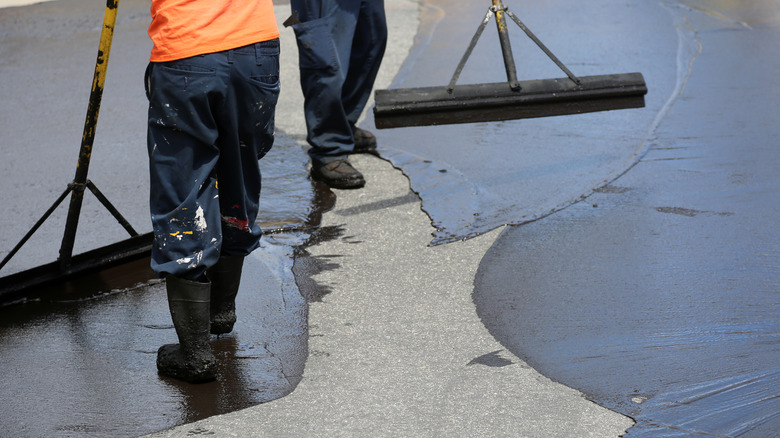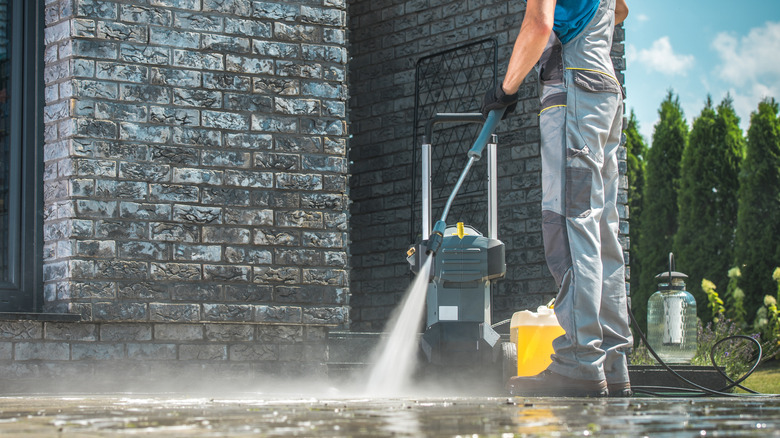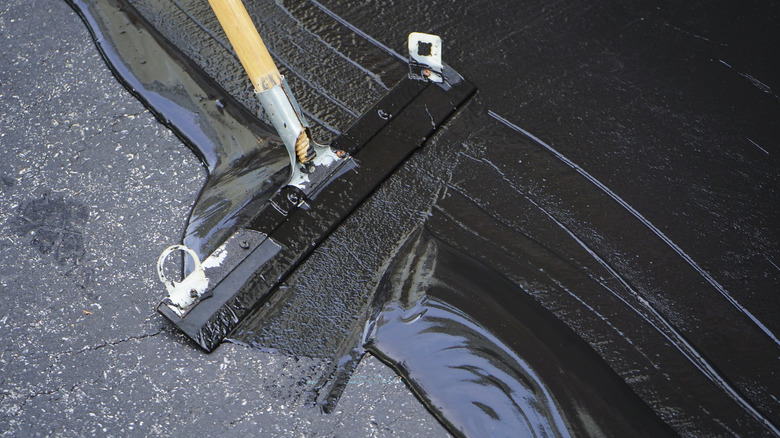Why You Should Always Pressure Wash Your Driveway Before Sealing It
Driveways are made with various materials that each have their own pros and cons. They all have one thing in common, though: They're porous. TrueGrid talks about just how absorbent these materials are, and notes that, because driveway materials soak up everything, they need to be sealed in order to protect the strength of the road.
No matter what material your driveway is made of, it's an expensive investment you'll likely not want to replace any time soon. Driveways come in contact with many nasty things that can break them down, however, and ruin them over time (via Integrity). For example, car oil, deicers, mold, moss, and dirt collect on driveways in large quantities. Unfortunately, this type of driveway damage isn't covered by insurance, so you'll want to proactively care for your driveway the best you can. A properly applied sealant will protect the driveway for several years from further staining and make it easier to clean the driveway with a regular garden hose.
The best time of year to perform maintenance on your driveway is spring and summer, says Markstone Landscaping. Winter is usually when your driveway is under attack the most, with deicers, snow-removing machines, and freeze-thaw cycles. Therefore you'll want to be sure the driveway is maintained before all these events begin — starting with a pressure wash.
Do you need to pressure wash before sealing?
21Oak notes you don't need to seal your driveway annually. A newly sealed concrete driveway, for example, should last for four or five years. If your driveway is made of asphalt, however, this timeframe is roughly cut in half.
When it's time to seal your driveway, it's essential to understand everything that needs to be done before you start. One of the most critical steps is pressure washing the driveway. As Concrete Sealer Reviews explains, if you were to apply a sealant over stains and dirt, etc., you'd simply be sealing those into place. The point of a sealant is to create a barrier, to protect the driveway from future spills, growths, and the elements.
Further, and perhaps most significantly, not properly cleaning the driveway before sealing it will render the sealant almost noneffective. For example, imagine buying a sticker for your car, but instead of washing a spot on the window, you just stick it onto the car over all the dust and bird poop. The sticker isn't going to stay put for very long. The same goes for applying a sealant to a dirty driveway. All the dirt, oil, salt, mold, moss, chemicals, and algae under the sealant will weaken it and, as mentioned before, make it almost useless.
A poorly sealed driveway won't hold up to the elements and will break down much easier, according to Geyser Equipment. So not only are you wasting money on applying it, but you'll also have wasted more money repairing your poorly sealed driveway.
What to avoid when pressure washing the driveway
Before renting a pressure washer or borrowing one from your friend, here are a few things to keep in mind. First, Popular Mechanics says you shouldn't apply a sealer over severe cracks or dips in the driveway. It's best to repair more significant issues first, then apply the sealant. You'll also want to avoid using chemicals while cleaning the driveway (via Geyser Equipment).
Of course, using these products makes cleaning more manageable, and it just feels right to use a kind of soap when trying to clean. But many of the chemicals you might use can make it hard for the sealant to adhere to the driveway. Geyser Equipment also suggests using a pressure washer that can spray hot water. Hot water will kill organic materials, keeping them from growing back. Additionally, it'll make it easier to remove any grease and cut through oil on the driveway.
Lastly, take your time with the drying process. Let the driveway sit for a few days, then seal it. If anything has fallen on the driveway while it was drying, you can use a leaf blower to remove it or just a dry broom.


